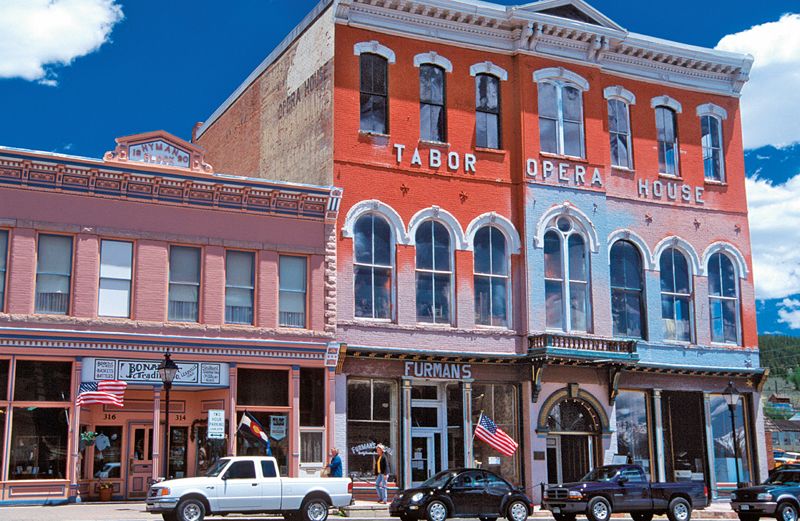I walked to the window of my new office and peered down at the yellow cabs and pedestrians 12 floors below. I could hear the horns honking, even this far up. I pinched myself, not quite believing I was working in Manhattan. My first day as a fiction editor for Guideposts Books.
I’d been a book editor for years, but this was something new for me, creating a dynamic fiction series, pulling characters and plots from my imagination. Now that I needed to actually come up with an idea, the doubts crept in. Could I really do this job? Not just edit a book but create a whole fictional world?
I said a quick prayer–a prayer for inspiration.
Many of Guideposts’ fiction series have featured charming seaside towns and protagonists who use both their faith and their wits. I’d just come to New York from landlocked Colorado. Maybe a western location would resonate with our readers.
I picked up a magnet I’d stuck on my office bookshelf. It read Leadville, Colorado: The Two-Mile-High City. One of the first places I’d visited when I moved to Colorado Springs. One June day a friend and I decided to drive to Leadville, the highest incorporated city in the United States.
My little car wheezed and gasped as it carried us from Colorado Springs’s 6,000-foot elevation to Leadville’s thin-aired 10,430 feet, passing herds of grazing buffalo and the silver mines that had fueled the area’s boomtown days.
It was sunny but quite cool despite the time of year. We wheezed a bit ourselves as we walked the streets gunfighters like Doc Holliday had once trod. The views were beautiful and Leadville’s rustic charms were irresistible.
The brick buildings had been constructed at the height of the town’s silver boom in the late 1800s, and even in varying states of disrepair, they still reflected the rich Victorian architecture of the era.
An old hardware store had been turned into an antiques mall and beautiful galleries had art depicting the rough-and-tumble days of the Old West. We passed the office of the Herald Democrat, Leadville’s newspaper, published since the 1880s. Restaurants looked as if they might once have served hardscrabble miners.
Then we came to the Tabor Opera House. We poked our heads in. There was the sound of hammering. Workers called to one another across the old auditorium. A gray-haired woman with glasses welcomed us and offered to give us a tour.
We climbed up to the lighting catwalks. We stood on the stage where turn-of-the-century luminaries such as Houdini, John Philip Sousa and Sarah Bernhardt had performed.
After giving a lecture there in 1882, the English wit Oscar Wilde visited a nearby saloon, “where I saw the only rational method of art criticism,” he wrote. “Over the piano was printed a notice–‘Please do not shoot the pianist. He is doing his best.’”
We were breathless from the exertion at the high elevation, but our hostess was unfazed. She, almost single-handedly, it seemed, was spearheading the restoration of the historic structure.
At the end of the tour we thanked her and joked about how hard it had been to keep up with her.
She laughed. “I’m in my eighties, you know,” she said. I was stunned. She looked much younger and had the energy of someone half her age. “I don’t know how much longer I’ll be able to keep working to fix up this old place, but I will as long as I can, and then I hope my daughter will take over….” She left it there.
Now, years later, as I remembered her passion for the place, I thought, She could be the main character in the fiction series. Not exactly her, but someone with her indomitable spirit, and the setting would be an old Western town with a colorful history.
Thus was born Sadie Speers, the heroine of our new series Mysteries of Silver Peak. Instead of restoring an old opera house, Sadie runs an antique shop, but she’s just as knowledgeable about her town as my tour guide was. She’s the person everyone turns to with questions about its history and mysteries.
As the first Silver Peak book rolled off the presses I wondered, Who was that woman we spoke to? Whatever happened to her? I searched online. Lo and behold, front and center on the Tabor Opera House Facebook page was a photograph of our tour guide, Evelyn Livingston Furman.
There was also an obituary from the Herald Democrat. Mrs. Furman had died in February 2011, two months short of her ninety-eighth birthday. She was widely credited with saving the opera house.
Not only had she overseen its restoration but she was the one who, in 1954, purchased the building to prevent it from being torn down. Today it’s run by her daughter and son-in-law, just as she’d hoped.
Sadie Speers–like her real-life inspiration–is a woman with a passion for her town and its history. She puts that love to good use in each and every volume of this exciting series. I hope you’ll find the books, and Sadie, as memorable and inspiring as Evelyn Furman was to me.






